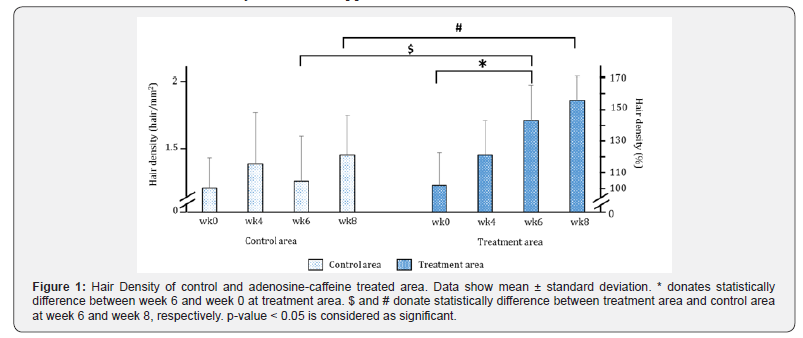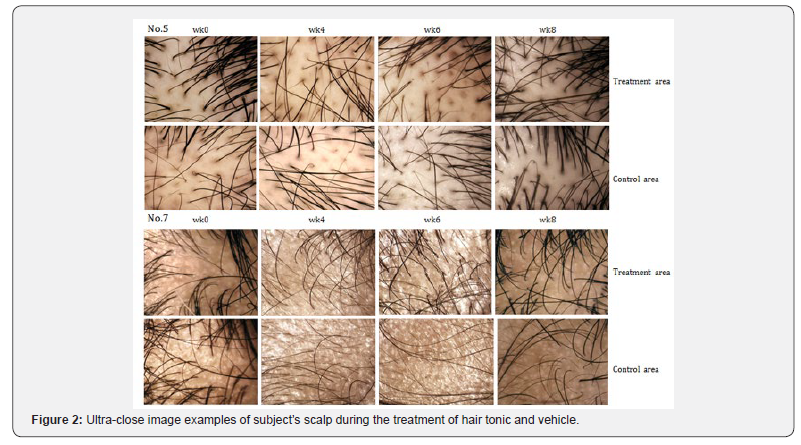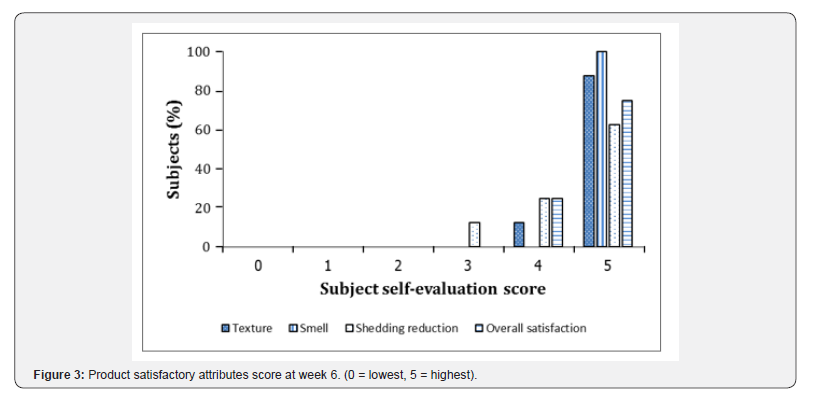A New Strategy Increases Hair Growth – Combination of Topical Adenosine and Caffeine Hair Tonic
Juniper Publishers- JOJ Dermatology & Cosmetics
Abstract
Male pattern hair loss (MPHL) and female pattern hair loss (FMPL) are important issues in cosmetic dermatology. The efficacy of hair tonic product containing 0.75% adenosine and 1.5% caffeine was assessed in male and female subjects with MPHL and FMPL. A single-blind, randomized, half-split study was conducted. Effectiveness of the hair tonic was assessed in the improvement of hair density by 6 weeks. In addition, satisfaction on product characteristics and hair shedding reduction were also evaluated. The results showed that the hair density was significantly increased by 40% and 55% at week 6 and week 8, respectively. Subjects scored high level on product characteristics and efficacy. No serious side effect was observed after the application. The results showed that 0.75% adenosine and 1.5% caffeine hair tonic were effective in MPHL and FMPL subjects with a high level of overall satisfaction.
Keywords: Hair Growth Adenosine Caffeine Hair Tonic Alopecia
Introduction
Male pattern hair loss (MPHL) and female pattern hair loss (FPHL) are common situations that generate negative impact in patient self-esteem. MPHL, also known as androgenic alopecia, often showed moderately miniaturization of hair follicles and hair shedding. The cause of MPHL is considered as an androgen-dependent. The major causes of MPHL may include hormonal dysfunction, extracellular matrix proteins in the follicular bed reduction, and local inflammation [1]. In case of FPHL, hair density reduction is often recognized. The miniaturization of hair follicles in FPHL is typically localized in the central-, frontal-, and parietal-scalp area [2]. FPHL is relevant to multiple genes, factors, and environmental influences [3]. Previous study showed that the development of FPHL may be involved with androgen [4]. Another study suggested that FPHL may be associated with metabolic syndrome [5]. The prevalence of MPHL and FPHL has been widely studied. Topical administration of hair tonic containing some active ingredients such as caffeine and adenosine has been reported for their effectiveness in hair loss [6,7]. It is known that androgen is an important regulators of hair loss and 5α-reductase enzyme is a critical factor. Testosterone is metabolized by 5α-reductase enzyme to 5α-dihydrotestosterone (DHT). The high level of DHT could suppress hair growth, which was found in bald scalp. Caffeine could inhibit 5α-reductase enzyme activity leading a reduc tion of DHT in the scalp and improving hair follicle growth stimulation [1]. In the case of adenosine, an activation of adenosine receptor in the scalp could increase the production of fibroblast growth factor [8]. These mechanisms could have effects on hair growth enhancement. Therefore, a combination of both caffeine and adenosine, may provide an effectiveness to male and female with early MPHL and FPHL. The aim of this study was to assess the efficacy of topical adenosine and caffeine hair tonic in comparison with a placebo (vehicle only) in male and female with early MPHL and FPHL. Product attributes satisfaction and hair shedding reduction of subjects were also evaluated and discussed.
Materials and Methods
Subjects and Treatment
A single-blind, randomized, half-split study was conducted. Eight subjects aged 30-51 years with early MPHL and FPHL, who experienced an increase in hair shedding participated in the study. One point five milliliter of 0.75% adenosine and 1.5% caffeine hair tonic was applied to the fixed area on one side of the subject’s frontal scalp, designated as the Treatment area. On another side of the scalp was treated with the same volume of vehicle to serve as the Control area. The subjects were blinded to the treatment, both adenosine-caffeine solution and vehicle were applied twice a dayfor eight weeks. The study protocol was conformed to the declaration of Helsinki and the written informed consent were obtained before the recruitment.
Efficacy and satisfactory evaluation
During the studying periods, the scalp was examined for the sign of skin irritation every day. Fixed area ultra-close image of the hairs and scalp was photographed by IBS-01Pro Intelligent Beauty Scope (Kowa Optics Corp., Taiwan) every week. The total number of hairs was counted using J Micro Vision (version 1.2.7), and the hair density was determined as the total number of hairs per 1 mm2 area in a blind manner by the investigator. Nominal Paired t-test was used for statistical analysis (Excel 2013, Microsoft, USA). The significance of the results was considered at a p-value < 0.05. Secondary evaluation for subject’s satisfactory on product characteristics and hair shedding was assessed using questionnaire. Perceptiveness scores were analyzed using Pareto chart (Excel 2013, Microsoft, USA). In addition, allergic reaction on the scalp was assessed.
Results
Effect of treatment on hair density and overall appearance


All subjects completed 8-week study. None of the participants showed the sign of skin irritation. At week 0, the hair density of the control area was 1.19 ± 0.23 hair/mm2, which was not difference to the treatment area, 1.21 ± 0.25 hair/mm2. No significant differences in hair density or overall appearance in the control area was observed (p-value > 0.2) (Figure 1). In contrast, combination of adenosine and caffeine hair tonic showed a significant improvement in hair density (Figure 1). At week 6, hair density of treated scalp was 1.7 ± 0.27 hair/mm2, significantly higher than that of the control area, 1.24 ± 0.34 hair/mm2 (p-value < 0.05). Similarly, hair density of treated area in week 8 was significantly higher than that observed in the control area (p-value < 0.05). At the end of the study, about 55 percent increment of hair density was observed in the treatment area, indicated the favorable effects of the combination of topical adenosine and caffeine treatment on hair growth. The ultra-close image examples of subject’s scalp were shown in (Figure 2). The images showed dramatic improvement of hair density in comparison to the untreated area, as a similar manner with the result in (Figure 1). The hair density at a hair tonic treated area of subjects at week 6 and week 8 were significantly denser
Product satisfactory assessment
No adverse reactions or allergic reactions due to the application of 0.75% adenosine and 1.5% caffeine hair tonic or placebo hair tonic were observed in any subjects in this study. (Figure 3) showed product satisfactory attribute score, add which were evaluated by all subjects after using the hair tonic. The average scores of product attributes such as texture and smell were 4.88 ± 0.35 and 5.00 ± 0.00, respectively. More than 80% of subjects indicated high level of satisfaction on product’s texture and smell. The level of hair shedding was considered as high (4.44 ± 0.9). More than 100% of the subjects recognized the hair shedding reduction afterapplying the hair tonic. In total, 75% of subjects revealed very high satisfaction on the hair tonic and the overall satisfaction score was 4.46 ±0.43.
Discussion
A combination of adenosine and caffeine in hair tonic significantly enhanced the hair density compared to baseline. Previous study revealed that an application of 0.2% caffeine-based topical liquid on scalp could improve anagen hair in androgenetic alopecia males [6]. An increase in anagen hair may be due to the anagen phase prolongation by caffeine. Caffeine, as a phosphodiesterase inhibitor, could enhance cyclic adenosine monophosphate levels in cells and then increases cell proliferation via stimulation of cell metabolism [9]. The testosterone/dihydrotestosterone-induced miniaturization of hair follicle may be counteracted by caffeine [10]. This mechanism of caffeine may increase the hair density of subjects after hair tonic application. Adenosine also showed effects on hair density improvement as reported in previous studies [7,11]. Adenosine has an effect on the upregulation of fibroblast growth factor production by adenosine receptor A2b activation [8]. In addition, a stimulation of adenosine receptor could decrease inhibitory factor transforming growth factor [12]. The modulation of genes encoding growth factors including fibroblast growth factor and transforming growth factor by adenosine resulted in hair growth enhancement by adenosine. In a similar manner, our hair tonic containing adenosine could improve hair density of subjects. The product attributes such as texture and smell, hair shedding reduction and overall satisfaction scores were considered as high. The high scores confirmed that 0.75% adenosine and 1.5% caffeine hair tonic provided a high level of subject satisfaction and promote an adherence to long-term application.

Conclusion
The hair tonic containing 0.75% adenosine and 1.5% caffeine showed the efficacy in hair density enhancement by 6 weeks compared to baseline. Subjects scored high level on product characteristics and efficacy. No serious side effect was observed after the application. The results showed a high level of subject satisfaction.
For more Open Access Journals in Juniper Publishers please click on: https://juniperpublishers.com/
For more details JOJ Dermatology & Cosmetics (JOJDC) please click on: https://juniperpublishers.com/jojdc/index.php
For more about Juniper Publishers Please click on: https://juniperpublishersblog.wordpress.com/

Comments
Post a Comment